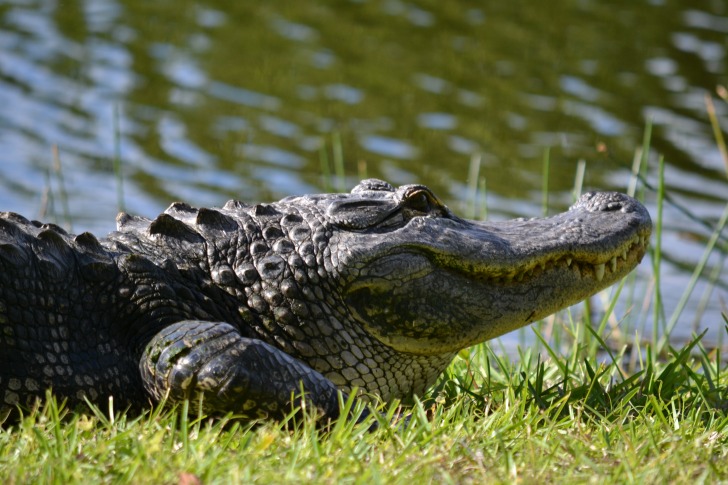Alligators are giant semi-aquatic reptiles living in still or slow-moving water bodies.
Alligators are endemic in the U.S. but only inhabit the lower southern coastal region.
The northern parts of the country are not conducive to alligator survival.
The reptile’s history in the states is a vision that came true through conservation efforts.
Alligators have been on the list of endangered species since 1973.
The Endangered Species Act (1973) ratification in 1987 delisted alligators from its list because of their population growth.
However, alligators are yet to invade the north of our country.

Contents
- So… Are There Alligators In Michigan?
- Alligator Species In Michigan
- Are There Places You Can Swim In Michigan?
- The Best Swimming Holes In Michigan
- Interesting Alligator Facts
- Alligator Vs. Crocodiles. Are The Two Reptiles Different?
- 3 Safety Tips For Swimming In Areas Infested With Alligators
- Summary
- Michigan Safety Overview
- Frequently Asked Questions
So… Are There Alligators In Michigan?
There are no alligators in Michigan existing in the wild.
The only alligators in Michigan are held in captivity.
Although there are no wild alligators in Michigan, you can have an opportunity of seeing one by visiting sanctuaries or private aquariums.
Michigan State has no restrictions on owning pet alligators.
The best place you will see an alligator in Michigan is the Critchlow Alligator Sanctuary.
The home provides sanctuary to around 200 alligators.
At Critchlow Alligator Sanctuary, you will get the opportunity of seeing gators as small as a foot long.
The giant Alligator in the home is “Medusa” at 11 feet.
Alligators can reach lengths beyond 14 feet, males being longer than females.
The many sightings of alligators in Michigan result from unwilling pet owners who release them into the wild.
Critchlow Alligator Sanctuary reports about 20 to 30 rescues per year.
Alligator Species In Michigan
Alligators and Crocodiles may look closely related but are from different families.
Alligators in Michigan are the same species found all over America.
Gators are in the family of Alligatoridae under the genus of Alligator in the order of Crocodile.
The family has two main species, A.Mississipiensis, which you may find in Michigan and the rest of America.
The species is commonly known as the American Alligator.
The other species is C. Mississipiensis (Chinese Alligator), native only to China.
Are There Places You Can Swim In Michigan?
Michigan offers solid opportunities for swimming.
The state has more than a 60-mile coastline and great freshwater lakes where you can cool off during summer.
Michigan has four great lakes, which supply a fifth of surface freshwater worldwide.
There are also over 11,000 inland lakes in Michigan, and you will always be within range of a swimming spot.
The Best Swimming Holes In Michigan
Millennium Park, Kent
Do you love splashing along sandy shores?
The 100-acre lake at Millennium Park has a six-acre sand beach.
You can swim in the lake from late spring when it opens to early fall.
Millennium Park also offers boat rental services and has a beach house too.
Your kids, too, will have a fun time at the beach.
Our splash park has dozens of sprayers, rides, and buckets, making it popular with young ones.
You can go hiking and cycling in the Millennium Park on hundreds of trails within the 1500-acre Park.
Pickney Recreation Park
The recreation park is in the background of more than one lake, including Halfmoon Lake, Silver Lake, and Pickerel Lake.
Pickerel lake restricts the use of boats and other motorized water vessels, making it friendlier than other lakes within the Park.
Pickerel Lake has clear waters and can reach depths of up to 56 feet.
Ocqueoc – Falls, Presque Isle
Although the fall will not qualify for height awards, the pool below has plenty of room for swimming.
Ocqueoc Fall is the only waterfall you can swim at in Michigan.
The place offers a great picnic and a hiking site too.
The site’s decked ramp allows accessibility for people with special requirements.
You can easily maneuver a wheelchair on the ramp.
Torch Lake, Kewadin
It is the number two biggest lake in Michigan.
Despite its size, its perimeter has few public beach spots.
A visit to William Good Day Park will allow you to splash in the lake’s water.
At the park, we have picnic tables, and you can ride a boat too.
Olive shore, West Olive
The 700- feet shoreline on Lake Michigan has something for everyone.
You can hike on the trails in the meandering forest along the shore while exploring dune formations on a 20-acre land.
Olive shore sandy beaches offer a spectacular place for swimming.
Black Rocks, Marquette
Black Rocks is a popular spot for adventurous swimmers.
You can practice cliff diving at the site.
If you are timid of such places and love to swim in moderate waters, head to Rocks Beach.
Fisherman’s Island, Charlevoix
Fisherman’s Island swimming hole is located in a 560-acre nature park along Lake Michigan.
You can choose a spot to dive into the lake’s water along the five-mile beach.
There is a 3-mile trail through dunes covered with aspen and birch for hikers.
The site is also popular in winter, offering opportunities like snowshoeing and country skiing.
Splash Universe, Dundee
Are your schedules not considering perfect weather for outdoor swimming?
Michigan has several indoor swimming holes you can visit.
Splash Universe is an indoor waterpark in Dundee where you can play in water even when venturing outdoors is not favorable due to weather conditions.
The park’s tubs, splash zones, and slides attract all ages.
Laketown Beach, Holland
Laketown Beach is a small popular attraction for the locals in Michigan.
Visit the site on the beautiful shoreline of Holland to experience why the locals rave about the place.
Climb the steps to the top of the dunes and have a spectacular view.
If you want a peaceful swim on a quiet beach, visit Laketown Beach, Holland.
Higgins Lake, Roscommon County
Apart from the Great Lakes, Michigan has indoor lakes, which will give you a lifetime experience while vacating the state.
Higgins Lake is an excellent place to visit while in Michigan and play in its waters.
The lake boasts a 21-mile shoreline with plenty of public areas where you can dip in the waters.

Interesting Alligator Facts
An alligator’s mouth and jaws are not adapted to chewing food.
The reptiles swallow big chunks of food and digest their meals using internal digestive juices.
Alligator teeth get worn out during feeding and hunting processes.
The teeth are adapted for tearing, crunching, and grinding food.
The reptile can crunch bones and turtle shells to get a meal.
However, alligators are lucky and do not require dentist attention to replace their teeth.
An alligator can grow up to 3,000 teeth in its life span.
The mother alligator builds a nest to incubate her eggs but does not sit on them.
The nest is covered with vegetation and mud.
The mother stays nearby and splashes water on the mound to cool the temperature.
The nest temperatures determine the sex of alligator hatchlings.
The eggs will produce a female at temperatures of 31 C (87.8F) or lower.
Males require temperatures of 32 C (89. F).
Baby alligators grow a foot in length per year in the early stages of life until they attain six feet.
The growth rate declines, but a gator can grow to more than 10 feet at maturity.
Males can reach a length of 14 feet depending on diet and location.
An alligator’s lifespan averages forty years in the wild.
There are cases of alligators prolonging their lives up to 60 years and beyond.
An alligator is not purely a carnivorous animal; the reptiles are known to feed on fruits and berries thriving near their habitat.
Alligator Vs. Crocodiles. Are The Two Reptiles Different?
These two reptiles can seem confusing to distinguish.
Both live in water and look closely alike.
They have long tails, scary backs, thick skin, long snouts, and webbed feet.
However, the animals are from different families and have individual characteristics that uniquely identify them.
The Reptile’s Snout
An alligator exhibits a more rounded, broad snout.
A crocodile’s snout is more slender and sharp-pointed.
Locality
Alligators are only endemic in America and China, although we have the American Crocodile.
Alligators do not live in salty waters, unlike their distant cousin crocodiles.
Alligators can not thrive in the oceans because they lack glands to excrete salts.
Look Closely At The Closed Mouth
An alligator’s upper jaw is larger than the bottom one, making the reptile capable of encompassing all teeth when it closes its mouth.
A crocodile displays two or more teeth when it shuts its mouth.
3 Safety Tips For Swimming In Areas Infested With Alligators
We strongly advise you not to venture into waters suspected of harboring alligators.
Gators grow into large sizes and are heavy.
Alligators have long mouths that open wide and strong jaws used to crash their prey.
The animals are excellent swimmers who have adapted to staying underwater longer than men.
Their bites can be fatal and may result in a severe injury resulting in drowning.
If you are among the daredevils and do not fear the animals, observe the following precautions before venturing into waters infested with alligators.
Do Not Intrude A Nesting Or Nursing Alligator Territory
An alligator mother guards her mound with eggs from predators.
Any animal, even a man approaching the nest area, will have to face off with the mama alligator.
Upon hatching the alligator eggs, the mother carries the young ones to shallow waters where the currents are not strong and keeps an eye on any animal venturing into the nursery.
Alligator babies are a menu in the diet of many predators, including some adult alligators.
Don’t Allow Your Children Or Pets In Waters Infested With Alligators
Alligators’ food diversity widens with age and size.
Adult gators are known to hunt medium-sized mammals and large water birds.
While your child or pet splashes in waters infested with alligators, the reptile may intercept their noise and water vibrations to mean easy prey.
A gator can stealthily approach an unsuspecting child or pet and strike.
Please don’t blame the gator.
Their animal instincts are only driving them to get a meal.
Do Not Venture Into Wild Waters With A Known History Of Harboring Alligators
Seek full info on a wild water body, however attractive it may look.
Any slight hint of an alligator sighting in the water is a telltale sign of not going for a swim in such a hole.
Do not tempt the reptile.
Its hunting powers, skills, and techniques are fantastic in water.
An alligator’s attack while in water can easily overpower a man.
Summary
Pack your things and head out to Michigan for a lovely summer holiday.
You will have great fun splashing away the summer heat in the Great Lakes and other spots.
You will enjoy our waters without fear of alligators.
However, to see alligators while in Michigan, you will only see them captive.
If you are lucky and see one in the wild, do not panic; likely, the gator is a stray pet.
Michigan Safety Overview
READ THE FULL REPORT: Michigan Safety Review
Safety Index:
- OVERALL RISK: LOW
- TRANSPORT & TAXIS RISK: LOW
- PICKPOCKETS RISK: LOW
- NATURAL DISASTERS RISK: LOW
- MUGGING RISK: LOW
- TERRORISM RISK: LOW
- SCAMS RISK: LOW
- WOMEN TRAVELERS RISK: LOW
Frequently Asked Questions
How many people die every year from alligator attacks?
The number of reported deaths from alligator attacks over the years is few.
Alligators rarely attack humans.
The reptiles are submissive and will opt to scatter away from humans.
Are the lakes in Michigan always safe for swimming?
While in Michigan, be wise and get warning news of the lakes’ impending threats.
Sometimes, citizens are cautioned against venturing near the waters due to natural phenomena.
Why are there no alligators in the Great Lakes?
The northern parts of America have a climate that doesn’t favor alligators.
The freezing temperatures experienced up north make it hard for the baby alligator to survive during infancy.












It is safe to swim in Michigan as long as you follow safety precautions and avoid venturing into waters known to harbor alligators.